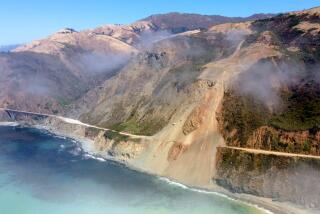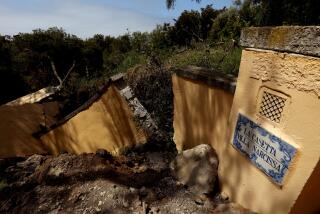Swept Away
After 24 years working for Rockwell International and living in Norco, Lou de Bottari could not wait to move out of metropolitan Southern California.
Speaking for himself and his wife, Sonja, de Bottari recalls, âWe wanted to get out of the air pollution. That was my wifeâs main goal, to get into the clean airâ and away from crowded living conditions.
âAnd then we had an opportunity to buy this motel in the West Walker River Canyon along Highway 395 in the Eastern Sierra, and we thought it would be a lot of fun to buy the place and run it until I got too old to do that.â
The de Bottaris sank most of their savings into the venture and moved in 1987. They had 11 cabins, a 3,000-square-foot house, a restaurant and a souvenir shop occupying a handsome site between the highway and the river.
Last summer, de Bottari told a Times reporter who happened to spend a night there that he was very pleased he was out of the city. He was living in paradise, he said.
At age 70, however, he was ready to move on. By the end of the year, he said, he believed he was close to finding a buyer.
But on Jan. 2, in the major floods that swept Northern California and western Nevada, the coupleâs Mountain Gate motel was swept away by the biggest flood in memory on the West Walker.
It also changed the course of the river and wiped out 10 miles of U.S. 395. The district manager of Caltrans in Bishop, Randy Iwasaki, says repairs to rebuild and reopen the highway are expected to cost $37.5 million and will not be finished for months.
A mile below the motel, the town of Walker also sustained many losses.
The de Bottaris were not insured against flooding, and they lost everything.
âItâs all gone except the front building, and that has about four feet of mud in it,â de Bottari said.
âSome of the contractors estimate it would take about a million dollars to rebuild the land and then a million dollars more to rebuild the place.
âThe Small Business Administration said that if we qualify, they would loan us $1.7 million, but that would require a payback of $8,400 a month. Thatâs beyond us.â
The de Bottaris, living temporarily now in Carson City, Nev., do not know what they will do permanently.
They have mainly their pungent memories of the flood.
âWe went to bed on New Yearâs night with no warning that anything was going to happen,â said de Bottari.
âI woke up at 6 a.m., and we had about two feet of water outside and a foot and a half in the basement. And then, soon, we had mud.
âAt first I didnât realize it was mud. It just seemed like muddy water. But then it became evident it was mud when the velocity of the water changed. The river bed just raised and it began coming into the lodge.â
At first, de Bottari thought of sandbags. Firemen helped him obtain some, and two Marines and another man who were passing by stopped to help the couple fill them.
But by 9:30 a.m., it was plain that wouldnât work.
Emergency authorities advised the de Bottaris to move their antique furniture to the second floor of their house and told them at 11 a.m. to flee.
Soon, they were gone. And, about the same time, so was their house and other property, swept down the canyon. All the furniture was also lost.
De Bottari is quite bitter about it. He believes the flood was intensified by Caltrans, which constructed passing lanes on the highway in 1986, and in so doing constricted the river.
âThey shrank the river and made it a fire hose,â he said, and he hopes for an investigation that will give him the basis of a claim against the agency. He said he has heard that Caltrans has hired an expert on rivers to report exactly what happened.
As of now, however, Caltrans officials say they are investigating only how to rebuild the highway.
âIt was a natural disaster and thereâs nothing to indicate it wasnât,â said Jim Drago, the chief Caltrans spokesman in Sacramento, although he did not rule out a further inquiry.
Iwasaki, the district manager, said the passing lanes were not decisive.
âIt was quite a high volume of water--we are told about 9,000 cubic feet a second as compared to maybe 1,000 normally--and the river left its original course in some areas,â he said.
More to Read
Inside the business of entertainment
The Wide Shot brings you news, analysis and insights on everything from streaming wars to production â and what it all means for the future.
You may occasionally receive promotional content from the Los Angeles Times.










